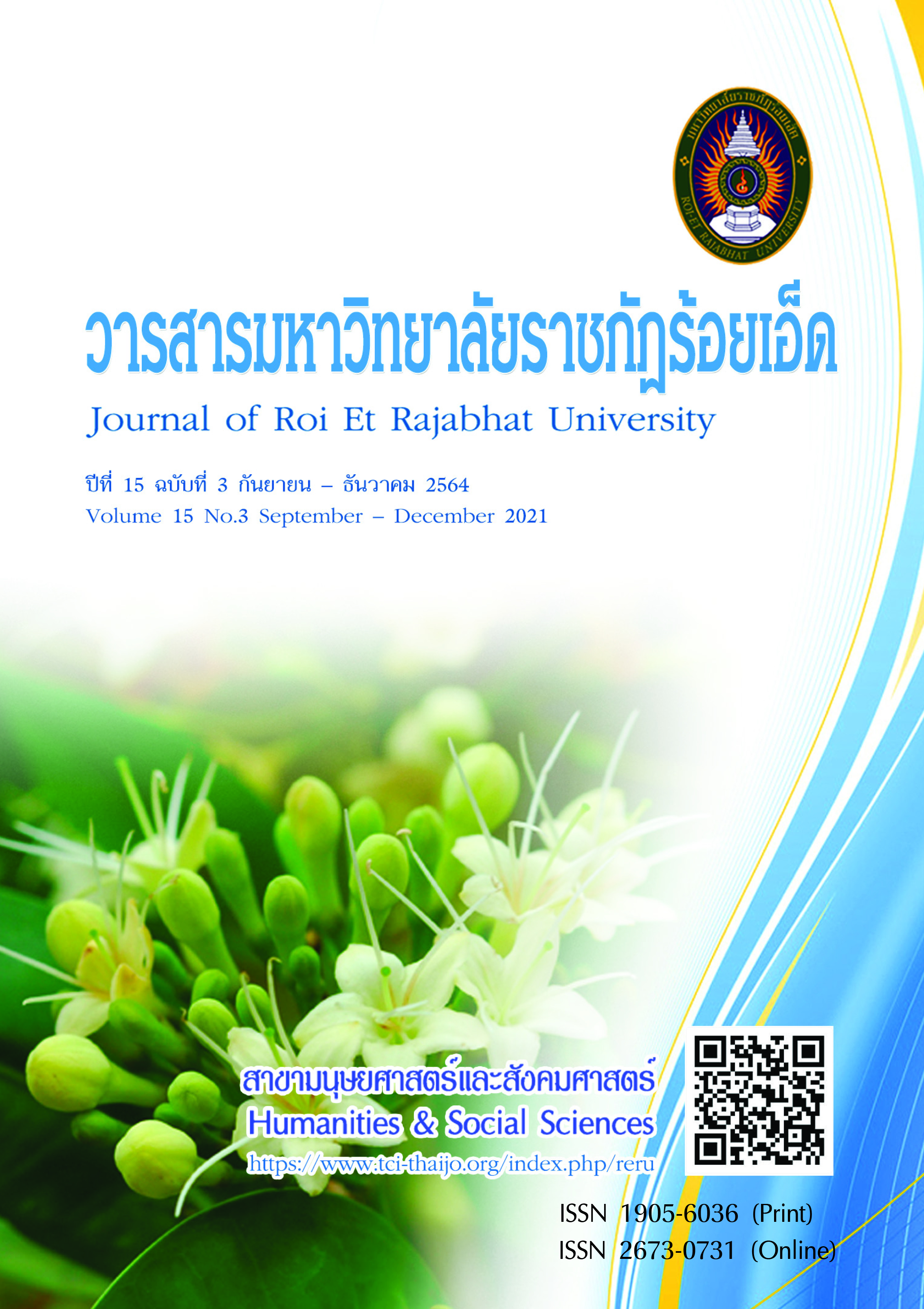The Effects of using the self- esteem Development Program and Emotional Intelligence on Moral Behavior of Roi Et Rajabhat University Students
Keywords:
Program of development the self- esteem development and emotional intelligence, Moral behavior, StudentsAbstract
The purposes of this research were 1) to study the level of moral behavior of Roi Et Rajabhat University students, and 2) to compare the effects of using the self-esteem development program and emotional intelligence on moral behavior of Roi Et Rajabhat University students between before and after the experiment. The population were 367 students of the 1st- 4th year in the bachelor’s degree program of social studies, faculty of education, Roi Et Rajabhat University. The samples used in the experiment were 28 students in the 2nd year of social studies. The research instruments consisted of 1) Moral Behavior Test 2) Program to develop self-esteem and emotional intelligence. Data were analyzed by using t-test for dependent samples. The results showed that: 1) Roi Et Rajabhat University students have moral behavior at a high level. 2) After participated the self-esteem development program and emotional intelligence, found that scores of moral behaviors in overall and in each aspect were significantly increased at the .05 level.
References
กรรณิการ์ ภิรมรัตน์. (2555). รายงานผลการวิจัยเรื่องแนวทางการพัฒนาพฤติกรรมทางจริยธรรมของนักศึกษา มหาวิทยาลัยราชภัฏในเขตกรุงเทพมหานคร. กรุงเทพฯ: มหาวิทยาลัยราชภัฏสวนสุนันทา.
กระทรวงสาธารณสุข. (2558). EQ ความฉลาดทางอารมณ์ในวัยรุ่น. สืบค้นเมื่อ 31 มีนาคม 2559,
จาก http://www.dmh.go.th/1667/1667view.asp?id=3928
จิรวัฒน์ วีรังกร. (2543). การจัดกิจกรรมนิสิตนักศึกษาเพื่อพัฒนาคุณธรรมจริยธรรมสำหรับบัณฑิตอุดมคติไทย. กรุงเทพฯ: สำนักมาตรฐานอุดมศึกษา.
เทอดศักดิ์ เดชคง. (2542). ความฉลาดทางอารมณ์ (พิมพ์ครั้งที่ 6) กรุงเทพฯ: มติชน.
ทศวร มณีศรีขำ. (2539). กลุ่มสัมพันธ์เพื่อการพัฒนาสำหรับครู. กรุงเทพฯ: มหาวิทยาลัยศรีนครินทรวิโรฒ.
ประสาร ศรีพงษ์เพลิด. (2559). รายงานผลการวิจัย เรื่องปัจจัยที่มีผลต่อพฤติกรรมทางจริยธรรม ของนักศึกษามหาวิทยาลัย
ราชภัฏร้อยเอ็ด. ร้อยเอ็ด: มหาวิทยาลัยราชภัฏร้อยเอ็ด.
ปาจรีย์ ติ้วสิขเรศ และรัตนา นฤภัทร. (2558). ผลการใช้กิจกรรมตามรูปแบบ BRAIN Model เพื่อพัฒนาความสัมพันธ์ในครอบครัวและการเห็นคุณค่าในตนเองของเยาวชนที่ถูกคุมประพฤติ. วารสารพฤติกรรมศาสตร์เพื่อการพัฒนา, 7(1), 119–134.
รุ่งนภา จันทรา, เพ็ญศริ ทองเพชร และอติญาณ์ ศรเกษตริน. (2559). ปัจจัยที่มีความสัมพันธ์กับคุณลักษณะของบัณฑิต
ที่พึงประสงค์ ตามกรอบมาตรฐานคุณวุฒิระดับอุดมศึกษาแห่งชาติของนักศึกษาพยาบาล วิทยาลัยพยาบาล
บรมราชชนนี สุราษฎร์ธานี. วารสารการพยาบาลและการศึกษา, 9(4), 90–101.
ศูนย์คุณธรรม. (2561). โครงการสำรวจสถานการณ์คุณธรรม จริยธรรมของสังคมไทย. กรุงเทพฯ: ศูนย์คุณธรรม.
อรุณี ทอมป์สัน. (2559). การศึกษาคุณธรรมจริยธรรมของนักศึกษาวิทยาลัยพยาบาลศรีมหาสารคาม. วารสารมหาวิทยาลัยนครพนม ฉบับการประชุมวิชาการครบรอบ 25 ปี วิทยาลัยพยาบาลนครพนม มหาวิทยาลัยนครพนม, 72-77.
Goleman, D. (1998). Working with Emotional Intelligence. New York: Bantam Book.
Miao, C., Humphrey, R.H. and Qian, S. (2017). Are the emotionally intelligent good citizens or counterproductive? A meta-analysis of emotional intelligence and its relationships with organizational citizenship behavior and counterproductive work behavior. Personality and Individual Differences, 116, 144-156.
Newman, B.M. (1986). Adolescent Development. Columbus: Merril.
Podesta, C. (2001). Self-esteem and the 6-Second Secret. California: Corwin Press.
Viguer, P., Cantero, M.J. and Bañuls, R. (2017). Enhancing emotional intelligence at school: Evaluation
of the effectiveness of a two-year intervention program in Spanish pre-adolescents. Personality and Individual Differences, 113, 193-200.
Will, T.A., Walker, C., Mendoza, D. and Ainette, M.G. (2006). Behavior and emotional self control: Relation
to substance use in samples of middle and high school students. Psychology of Addictive Behavior,
(3), 256–278.
Downloads
Published
How to Cite
Issue
Section
License
บทความที่ได้รับการตีพิมพ์เป็นลิขสิทธิ์ของวารสารมหาวิทยาลัยราชภัฎร้อยเอ็ด
ข้อความที่ปรากฏในบทความแต่ละเรื่องในวารสารวิชาการเล่มนี้เป็นความคิดเห็นส่วนตัวของผู้เขียนแต่ละท่านไม่เกี่ยวข้องกับมหาวิทยาลัยราชภัฎร้อยเอ็ด และคณาจารย์ท่านอื่นๆในมหาวิทยาลัยฯ แต่อย่างใด ความรับผิดชอบองค์ประกอบทั้งหมดของบทความแต่ละเรื่องเป็นของผู้เขียนแต่ละท่าน หากมีความผิดพลาดใดๆ ผู้เขียนแต่ละท่านจะรับผิดชอบบทความของตนเองแต่ผู้เดียว





